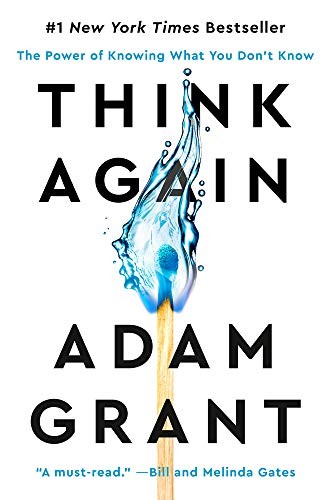Think Again by Adam Grant

Adam Grant is an organizational psychologist and professor at Wharton. He has written several #1 New York Times bestselling books including Originals, Give and Take, and Option B. Think Again is one of his latest that delves into the ability to rethink problems.
One of the most powerful concepts comes from the ability to reconsider especially after learning more information. There is a joy in being wrong and such experiences are an opportunity to embrace change and learn more–these actions will ultimately lead to better solutions and outcomes. It is well worth a full read, but here are some of the highlights:
Think Like A Scientist
Scientist make progress through hypothesizing and testing. They build a body of data and use it to move forward. When you come across information–especially new data–it is an opportunity to reconsider what you think you know. Doubt is productive and can be reframed as an opportunity to grow and provide increased capacity to learn.
“Every time we encounter new information, we have a choice. We can attach our opinions to our identities and stand our ground in the stubbornness of preaching and prosecuting. Or we can operate more like scientists, defining ourselves as people committed to the pursuit of truth—even if it means proving our own views wrong.”
Enable Multiple Viewpoints
One of the most effective ways avoiding bias is to give space and even combine multiple viewpoints together–something that modern news outlets drifted away from given their journalistic roots. We need to seek out information that might change your views in order to counter the confirmation bias. Adam suggests that we follow people who make you think, but may disagree with what they think. This gives place for multiple views and enables for a more complete picture. Learn from everyone.
“The curse of knowledge is that it closes our minds to what we don’t know.”
Ask Questions
When working with others, start on common ground and listen. Ask more questions than statements. Question how, now why. Ask questions such as, “What evidence would change your mind?” or “How were your opinions formed?” Be open to new ideas and affirm freedom of choice. Don’t shy away from conflict–but treat as a debate and don’t take it personally. Define identity in terms of values, not opinions.
“Once we hear the story and accept it as true, we rarely bother to question it.”
Group Settings
Enable psychological safety within companies and institutions and allow individuals to raise concerns and challenge the status quo. Abandon best-practices or in other words, don’t assume the current solution is the best. Throughout these settings, role-model humility.
“Strong leaders engage their critics and make themselves stronger. Weak leaders silence their critics and make themselves weaker.”
Highly recommend allowing Adam Grant to take you through this journey–it will certainly help form how you approach problems, work with others, and think again.